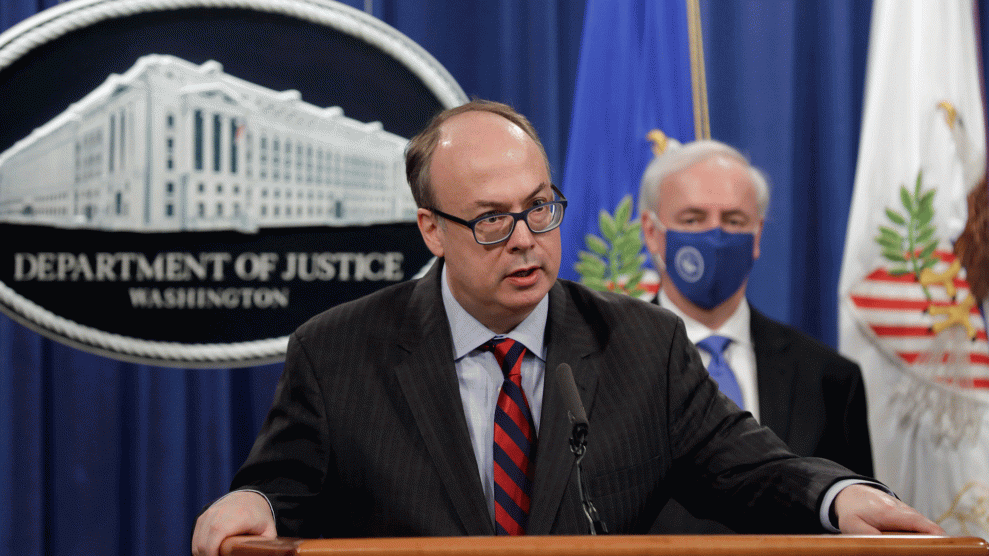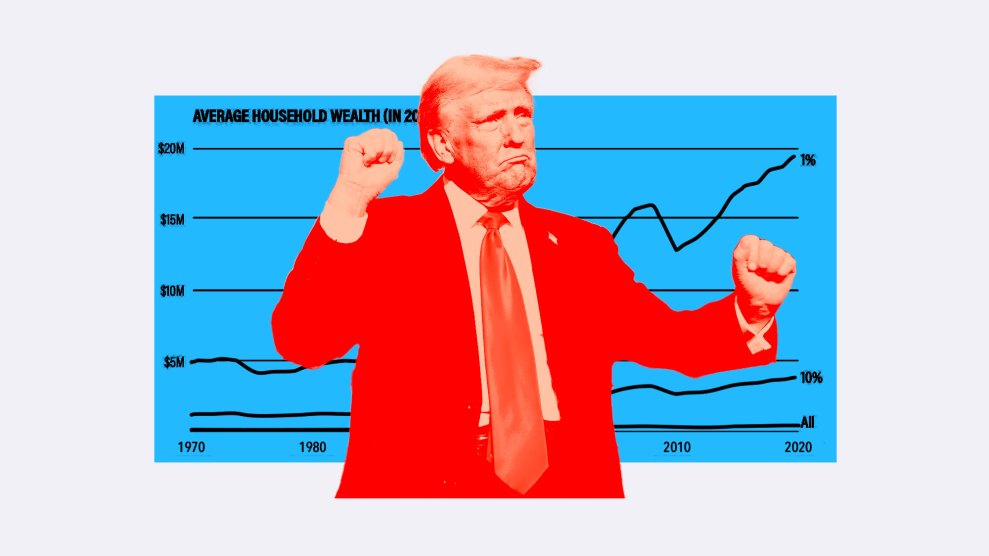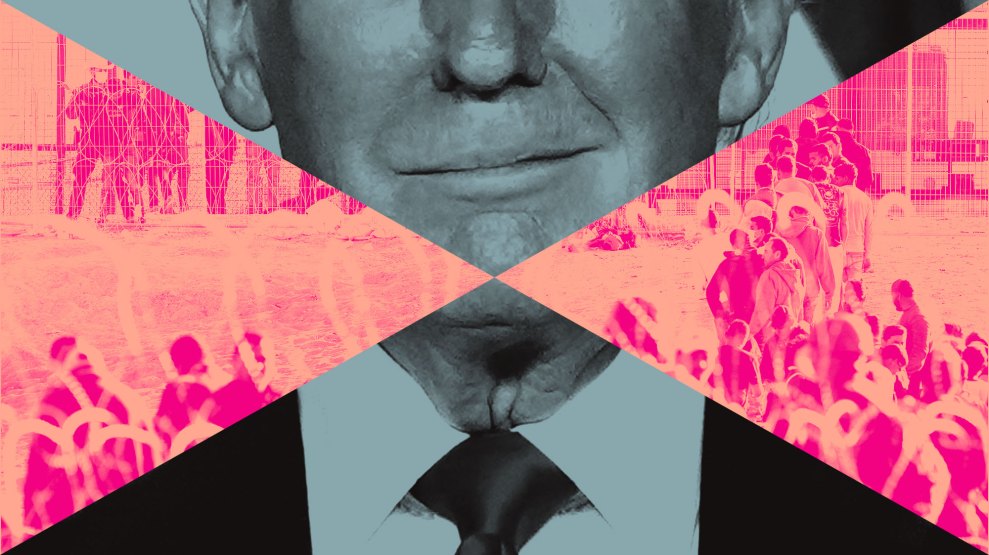
Former acting assistant U.S. attorney general Jeffrey Clark, who aligned himself with Donald Trump after he lost the 2020 election, has declined to be fully interviewed by a House committee investigating the January 6 Capitol insurrection.Yuri Gripas/AP
On Wednesday, the House committee investigating the January 6 attack on the Capitol voted to pursue criminal contempt charges against Jeffrey Clark, a former Justice Department official who schemed with Donald Trump to overturn the 2020 election results. Clark had refused to cooperate with the committee’s inquiry, citing Trump’s legal efforts to block its probe. Yet before officially requesting the Justice Department to prosecute Clark, the committee did offer him one more chance and asked that he come in for a deposition on Saturday. And Clark has agreed to sit down with the panel. But there’s a catch: his lawyer has indicated he will plead the Fifth Amendment and not answer certain questions.
After the election, Clark, the acting head of the Justice Department’s civil division (who had no authority over election issues), schemed with Trump and pressed top department officials to falsely state that its fraud investigations had cast doubt on the election results. When acting Attorney General Jeffrey Rosen resisted this pressure, Trump considered firing him and appointing Clark as acting attorney general so he could carry out the plot. In a worse-than-Watergate moment, Trump also directly leaned on Rosen and his top deputy, Richard Donaghue, to declare the 2020 election corrupt, though the Justice Department had found no instances of consequential fraud. And when Donoghue told Trump that the department could not undo the election results, Trump said, according to the notes Donoghue took, “Just say that the election was corrupt [and] leave the rest to me and the R congressmen.” (R stands for Republican.)
Clark is a key witness in the 1/6 committee’s investigation. He was in the middle of Trump’s conspiracy to subvert the election and retain power. And he has reason to fear a full accounting and to deploy his right against self-incrimination, for the skullduggery he engaged in with Trump might have been criminal.
A few months ago, when news of the Trump-Clark plot emerged, I asked Norm Eisen, who was President Barack Obama’s ethics czar and co-counsel for the House Judiciary Committee during the first Trump impeachment, whether Trump and Clark could be criminally prosecuted for their attempts to use their offices to sabotage the election. Eisen, of course, is an anti-Trump partisan. But he noted there was a possible case against both of them. Here’s our conversation:
Corn: Could Jeffrey Clark be prosecuted for trying to push DOJ officials to falsely declare the election corrupt? Under what laws? And would there be any criminal liability for Trump, who is clearly a co-conspirator?
Eisen: Yes and yes, depending on how the investigation evolves. For instance, 18 USC §610 makes it “unlawful for any person to intimidate, threaten, command, or coerce” a federal employee to “engage in…any political activity.” Prosecutors could decide Trump and Clark conspired to violate that statute. While there are not a lot of precedents, no president has ever gone this far into possible illegality before in American history.
Corn: Are there any statutes regarding use of federal office to defraud the public or encourage corruption?
Eisen: Robert Mueller often charged conspiracy to defraud the United States under 18 USC §371. That charge could apply because the courts have defined defrauding the United States as interfering with any lawful government function. There is certainly evidence that Trump and Clark among others were attempting to interfere with the lawful process of selecting a president, which Congress completes on January 6. Whether there is sufficient evidence to bring charges and win a conviction requires further investigation; what we know so far is likely just the tip of the iceberg. There are numerous other statutes that should be investigated including 18 USC §241 and §595. The law is not so foolish as to allow no recourse for attempts to legitimately overthrow an election. But we need to let DOJ (and the January 6 Committee) dig into the factual predicate and determine what is a winnable case here.
The first of the two laws Eisen referenced in that last paragraph makes it illegal for people to “conspire to injure, oppress, threaten, or intimidate any person in any State, Territory, Commonwealth, Possession, or District in the free exercise or enjoyment of any right or privilege secured to him by the Constitution or laws of the United States.” The second says it’s a crime for a federal or state official to use his or her official authority for the purpose of interfering with, or affecting, the nomination or the election of any candidate for federal office.
There has been no public indication that the Justice Department is investigating Trump or Clark for such possible violations of the law. Clark’s threat to plead the Fifth could be a sign he is worried about being prosecuted—or just a legal ploy to avoid testifying to the committee. Rep. Bennie Thompson (D-Miss.), the chair of the 1/6 committee, said that Clark’s attorney had provided “no specific basis for that [Fifth Amendment] assertion” and “no facts that would allow the committee to consider it.” He added, “This is, in my view, a last-ditch attempt to delay the Select Committee’s proceedings.” But the committee will find out on Saturday whether Clark deploys it.
Former Trump strategist Steve Bannon, who defied the committee, has been indicted by the Justice Department on two counts of criminal contempt. And former White House chief of staff Mark Meadows is also on the hot seat. The committee has considered seeking a criminal contempt charge against him, but it delayed action on that after Meadows this week agreed to cooperate on a limited basis. How limited? Meadows has told the committee he will not answer questions about his direct conversations with Trump.
The legal issues the committee must contend with can be complicated and time-consuming, and Trump and his allies are obviously trying to gum up the works. But the panel’s members realize that they must move expeditiously, given that the committee would probably be killed if the Republicans gain control of the House in next year’s mid-term elections. Clark is a key witness to Trump’s treachery. His account is crucial for a complete understanding of how Trump attempted to use the Justice Department to stage a coup. If Clark does not cooperate with the committee, it may take Justice Department action for the public to get the full story.
















